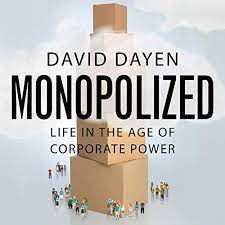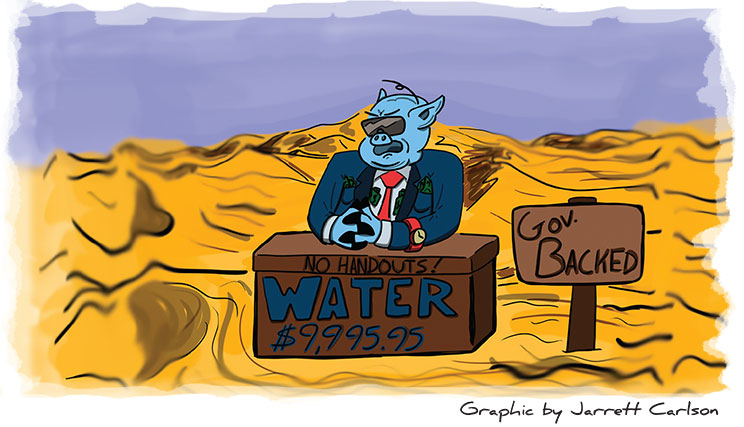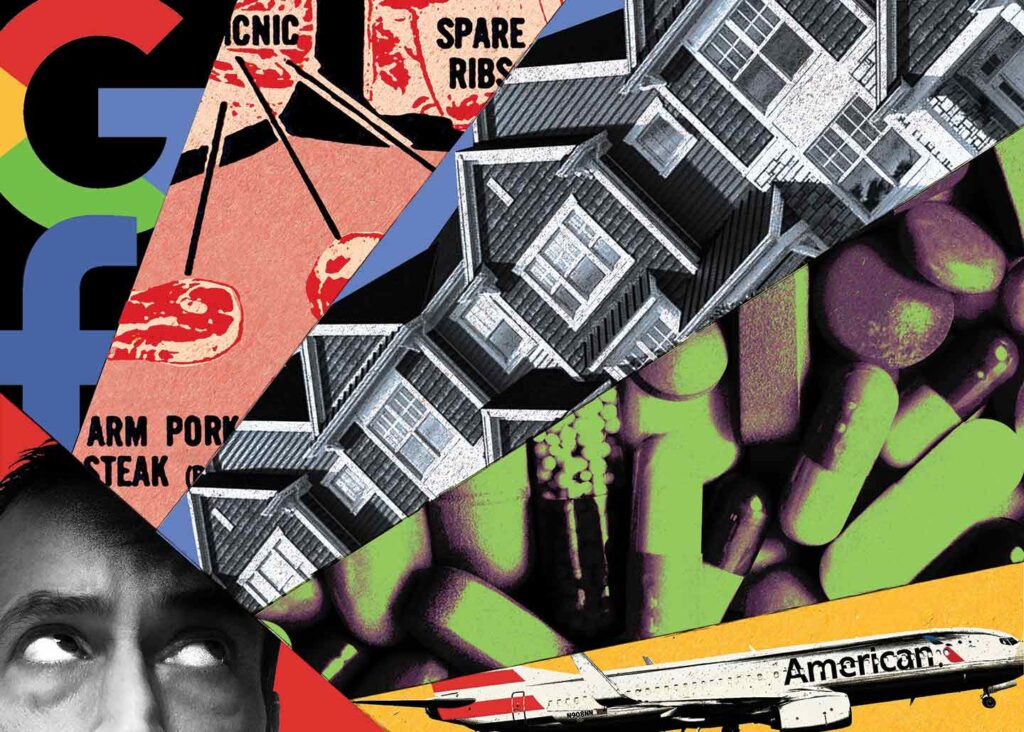Monopolies, Created Deserts, and Warren Buffets
Monopolized; Life in the Age of Corporate Power, David Dayen, 2021


This book is one of the most depressing, even apocalyptic in recent memory. It is also well researched, organized, and important.
Each chapter addresses an industry segment that has fallen to monopoly: Airlines, Big Agriculture, Journalism and media, Broadband Internet, Opioid medication, Banks, Offshoring essential products, Amazon and Google, Hospitals Supply chains, Rental Housing after 2008, Prisons and Immigrant detention. The book is focused on monopolies in each of these segments. Warren Buffet is mentioned as a significant investor in monopolies in each chapter. Dayen estimates that twelve mega-billionaires like Warren Buffet effectively control the entire US economy today. What can these handful of men possibly do with the wealth they have accumulated? This is from Jeff Bezos, currently the wealthiest:
The only way I can see to deploy this much financial resource is by converting my Amazon winnings into space Travel
Tesla’s Elon Musk seems to share Bezos’ sentiment. Dayen — “Our overlords literally shoot money into space while millions around them suffer.” Here is Buffet;
We think in terms of that moat and the ability to keep its width and its impossibility of being crossed.

Dayen — “Morningstar offers an economic moat index fund of the twenty companies with the highest walls around their businesses.”
The average age of a farmer in America is fifty-eight. In Iowa, 60 percent of all farm owners are over the age of sixty-five; just 1 percent are thirty-four or younger. More than half of all Iowa farmland is rented out, and the startup costs of land, machinery, and other inputs are a huge barrier to entry. A substantial number of farm owners are elderly widows who inherited the land. As they pass on, Iowa could be transformed.
As Iowa and other agricultural states empty out and businesses close, the states turn into people less deserts. Mono culture (single crop) farming with huge chemical inputs are transforming formerly fertile land into barren deserts. Deserts can take many forms and empty farmland is only the first discussed here.
The news deserts created primarily by the dominance of Facebook and Google and by the crippling of the media business model have grave implications for democracy…it’s undeniable that corruption spreads, conspiracies are fostered, and truth is obscured where journalism is absent.
This is the curse of bigness in San Francisco, a city so teeming with money that nobody can afford to open a store to take it…But the truth is that the San Francisco Bay Area is the nation’s second-most dense…Big money has created a vicious spiral: a winner-take-all city keeps accumulating vacant lots, dead-eyed commuters drive for hours to their barely affordable homes, landords must keep rents astronomically high to cover their own astronomically high loans. The concentration of extreme wealth isn’t just bad for the losers in depressed counties and towns. It’s bad for the winners.
Urban deserts are not limited to Flint and Detroit Michigan, to Oakland California and Philadelphia and Baltimore. Try living in today’s San Francisco. Several of my son’s San Francisco old high school friends are living lives as nomads in the city, complete with vans.
In telecommunications including cellphone and broadband America is a disgrace with the highest prices and lowest quality and service anywhere in the world. At America’s founding, postal service was guaranteed to every American. FDR’s Tennessee Valley Authority (TVA) together with massive western dam projects guaranteed electrical power to every American. At one time every American was guaranteed phone service. Dayen describes Chattanooga, a big beneficiary of the TVA, and its TVA run utility the Electric Power Board (EPB) which decided to upgrade using fiber optics to improve the reliability of its electric grids. In 2007 EPB decided to offer fiber optics to every home in its service area paid for by a $219.8 million bond. Comcast sued to stop the plan alleging illegal cross-subsidy of electric rate payer funds. Comcast lost and residents of EPB’s service area have access to gigabit broadband access supporting phone and internet service. If you are not in EPB’s service area you are in the communications desert.
I live in the heart of Phoenix Arizona and have access to Centurylink’s (baby Bell) DSL “service” of 16MB sometimes at a cost of about $50 per month. I have a grandfathered T-Mobile prepaid phone that gets no signal at my home even after the T-Mobile Sprint merger. I can make phone calls from my home via Android wifi on my T-Mobile phone or via voice over IP (VOIP) through google voice.
I live five miles from Phoenix’s TV Towers but receive no over the air (OTA) signals for any major network on my TV. Using advanced rooftop antennas and signal amplifiers, I used to be able to receive 5 major networks 95 miles line-of-site to the towers on Mount Lemon near Tucson. Continued reduction in transmit power by network operators has reduced reception to 3 major networks today. Even these 3 are sensitive to weather. I tried to raise the issue of reduced OTA transmitter power over the publicly owned airwaves with newly elected Senator Mark Kelly and was blown off by staff members.
If you live in rural America chances are you have no access to broadband. Urban Americans may typically have two “options” for broadband, your baby bell or surviving phone company and one cable operator. Both will have atrocious customer service and questionable reliability and unconscionable low speeds. Somewhere in a streaming chain, maybe the local broadband supplier is able to restrict speeds or break a stream altogether. We could get better service almost anywhere in the world. Most Americans live in a communications desert.
Dayen talks about the mergers and acquisitions (M&A) banking business that came into it’s own in the 1960s. Today it is a huge industry dominated by the six too big to fail banks.
As of 2019, the six biggest banks–JP Morgan Chase, Bank of America, Citigroup, Wells Fargo, Goldman Sachs, and Morgan Stanley–control $10.5 trillion in financial assets. These banks also happen to be serial transnational criminal enterprises, paying $182 billion in (inadequate) penalties for rap sheets of incomparable length. Few of the violations even relate to the financial crisis’s run-up and aftermath, though those were significant. Incidents of debt collection fraud, market rigging, money laundering, misrepresentations to clients, kickback schemes, and unlawful securities sales all occurred after the crisis.
The media has focused on stock buyback after tax reductions and record profits but gives little attention to the bigger story; mergers of corporations into ever larger and more unaccountable monopolies. The six big banks are key players in these mergers pocketing huge fees for their services. Goldman Sachs, in one merger featured in the book involving United Natural Foods Inc. (UNFI), continued to change the terms of the merger to favor themselves and even created and sold derivatives for hedge funds wanting to bet against the merger.
Mergers in the health care industry, especially hospitals has created large healthcare deserts in America. Hedge funds often buy hospitals for their real estate value and close them after gutting their operations. Millions of Americans are left with few options and long travel distances and time to seek services.
Monopolies create highly vulnerable supply chains often with sole source and offshore production. Dayen talks about an acute shortage of saline drip bags (cost $1) because production in sole source Puerto Rico was disrupted. This failure disrupted services in hospitals across the country. Covid19 protective equipment like masks, shields, gowns, etc. were simply not available for months. Then there are sole source parts like faulty batteries for the F-35 $100 million fighter jets that made them unable to escape Hurricane Michael in 2018. All current US Weapons systems are dependent on parts from China! Supply deserts are disruptive and dangerous and we are inundated in them.
Ten million American homes were lost to foreclosure as a result the 2008 financial subprime disaster. Dayen has an earlier book Chain of Title focusing on the struggle of American’s being illegal foreclosed on as a result of the massive production of fake documents purporting to support the existence of loans. Aaron Glantz in 2019 published Homewreckers, showing the macro side of how all these illegally foreclosed homes ended up in the hands of hedge funds and other bottom feeders and were removed permanently from the American supply of individually owned homes. Dayen here talks about how these new owners, without experience in real estate rentals and without any regard for the law or people converted these homes into badly or unmaintained rentals and profited from illegal fees, penalties, evictions, and extortion while the huge inventory of once livable single family homes are turned into slums. These few corporations make the Trumps and Kushners of the world look like petty thugs. Meantime, Americans looking to buy homes find limited options and soaring prices. Welcome to the housing desert.
We know how to handle monopolies. You restore the interpretation of the antitrust laws to cover the full spectrum of harms, beyond just consumer welfare. Then you break up dangerous concentrations of economic power, block mergers that would excessively consolidate markets, regulate natural monopolies as public utilities, structurally separate functions where necessary, intervene in the public interest so citizens are protected and empowered, and vigilantly examine markets to prepare for monopolies to emerge again. Maybe that sounds impossible in the abstract. But it is entirely possible under existing law that either hasn’t been enforced in decades or has been misinterpreted for decades. We have over a century of experience with both successfully preventing unnecessary concentrations and failing to do so. The mechanisms are clear; getting the political class to enforce them is the stumbling block.